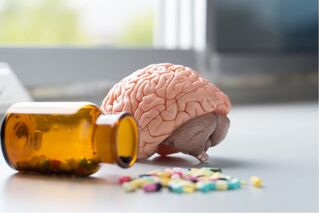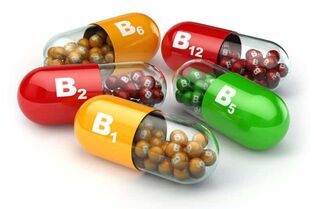Hello, dear readers! Have you ever felt that your brain is tired and your memory is deteriorating? I assure you: most people on the planet experience these feelings. Of course, overwork for everything, the impact of megacities, chronic diseases, stress, simply aging, because the body fights with the help of nutrients. As a result, our brains do not always have enough vitamins and minerals, because the saturation of food with vitamins and minerals requires a lot. And it takes a week or two to drink the vitamin-mineral complex, and everything is getting better. Let's take a look at which vitamins are best for improving brain function and memory.
What vitamins does the brain need?
The brain is the main organ that regulates the functioning of all organs and systems in our body. Stress, malnutrition, disease, and hormonal imbalances reduce its effectiveness.

Vitamins play an important role in the functioning of the central nervous system. These are the names of various organic compounds of a chemical nature. They are found in food and enter the body with them. Our bodies produce some of them on their own. However, due to the weakened immune system and low-quality products, these compounds are not often found in our bodies. The brain is primarily responsible for the deficiency. Memory is impaired, concentration decreases. Every system or organ in the body needs some biological substances, vitamins and minerals more than others. For example, hair needs biotin, zinc, selenium (I wrote about hair vitamins), the immune system needs vitamins B, C, vit. D3, a woman's body needs vitamins. Groups A, E, and B, a woman still needs her vitamins after giving birth.
Personally, I am in favor of the presence of natural vitamins, foods, herbs, extracts, and I have written a lot about it, but sometimes the body needs to be supported by pharmaceuticals, and at certain points in life they are simply necessary.
And to avoid confusion about which vitamins are in which products, read the article "Choose vitamins by color".
Children, in particular, need to take vitamins regularly. Their bodies grow rapidly and require nutrients to build new cells. To compensate for vitamin supplements, doctors recommend taking pharmaceuticals with synthetic analogues.
Among the many beneficial compounds for the body, pay attention to the following substances, which are very important for the normal functioning of the brain.
Beta carotene and vitamin A
Beta-carotene is a compound that is converted to vitamin A under the influence of color pigment. Matter improves memory, vision, and protects the brain from negative influences. Communication prevents thinking disorders.
B vitamins
This group includes a number of vitamin supplements that are beneficial for both adults and children. They are powerful antioxidants. If they are not enough in the body, the neurotransmitters are destroyed. Each type of vitamin affects the brain:
- B1 (thiamine).Most of the matter is in the brain and central nervous system. This has the greatest effect on memory. It prevents the aging of the brain by supplying oxygen to the connective tissues. Vitamin B1 deficiency leads to depression, fatigue and fatigue.
- B2 (riboflavin).Communication provides energy to the body and stimulates active brain activity. If you do not have enough vitamins, you will feel tired.
- B3 (nicotinic acid).Substance is required for the synthesis of enzymes. The compound helps the body produce energy and gives it to the brain.
- B5 (pantothenic acid).Vitamins are very unstable and disappear quickly during cooking. Communication is responsible for long-term memory, the transmission of information between brain cells. The compound protects the brain from the effects of nicotine and alcohol.
- B6 (pyridoxine). Communication improves thinking skills and prevents depression. It is better to take vitamin supplements to provide the body with this substance.
- B9 (folic acid).Vitamins are responsible for memory, the normal functioning of the nervous system, and strength. The compound is needed to build the central nervous system of the fetus because it helps pregnant women give birth to a healthy baby.
- B12 (cyanocobalamin).Matter allows the body to wake up and vice versa. Warranty is also closely related to short-term memory. With B12 deficiency, difficult adaptation occurs when changing the time frame.

Vitamin C
We know ascorbic acid as an activator of the immune system. But the substance is recommended for fatigue, relieving mental strain. Ascorbic acid is also an antioxidant that protects the brain from aging.
Vitamin D
In addition to improving the condition of the skeletal system, vitamin D or calciferol is needed to improve mood and memory. It protects the nervous system from diseases, including cancer, and stimulates the cardiovascular system. Calciferol deficiency causes cognitive impairment. Learn more about vitamin D and the foods it contains.
Vitamin K
Vicasol or vitamin K is used to speed up the brain, slow down the aging of brain cells and prevent Alzheimer's disease. The compound improves cognitive functioning.
lecithin
This is the name of a phospholipid that stimulates the nervous system. In the presence of vitamin B5, it is converted into acetylcholine, a neurotransmitter responsible for transmitting nerve impulses.
In the first years of life, the baby's body receives lecithin from breast milk. Speech development, social adaptation, and the child's progress depend on the amount of phospholipids taken. Lecithin helps an adult maintain efficiency and reduce fatigue. Learn more about lecithin and what foods it contains.
Omega-3 fatty acids
These compounds, found in fish oils, nuts and seeds, are literally brain products. They speed up reaction time, improve memory, and help keep the mind clear.
creatine
Nitrogen-containing amino acids accelerate cell regeneration. It plays an energy-saving role, provides good memory and analytical thinking. 5 g of substance is enough to keep the brain functioning.
L-tyrosine
An amino acid found in muscle tissue. It provides the synthesis of the neurotransmitters adrenaline and noradrenaline, dopamine. Supplementation with this substance is indicated for people with mental labor. It improves concentration and raises the fatigue threshold.
L-carnitine
Another amino acid that improves memory and brain function. If you take supplements regularly, you can activate the brain, eliminate chronic fatigue and increase efficiency.
Symptoms of vitamin deficiency
A number of factors can damage brain cells. They gradually heal, but with age the processes of malnutrition, pain and stress slow down. Lack of vitamins that support the building of cells and the basic functions of the central nervous system affects the functioning of the brain:
- depression occurs, anxiety, aggression, mood swings occur;
- memory impairment;
- coordination is broken;
- sleep is disturbed;
- Apathy, fatigue;
- headache;
- Absence, difficulty concentrating;
- slows down the thought process;
- weight loss, loss of appetite;
- Children have learning difficulties and fatigue increases.
Vitamin deficiency hides serious diseases. Before taking it, it is better to consult a doctor, because an allergic reaction or other reactions are possible against the background of current pathology.







































































